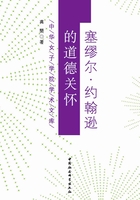
Abstract
Prominent in all his writings,Samuel Johnson's moral concerns greatly influenced eighteenth-century British thought.They are even believed to have contributed to the making of modern England.By today's academic standards,what Johnson and his contemporaries thought of as moral problems may fall into many areas of study,as different as anthropology,economics,history,politics,and theology.This dissertation focuses on Johnson's ideas on social morality,politics,and literary criticism,occasionally touching on his religious thoughts.
Chapter I considers Johnson's most celebrated periodical the Rambler in three respects,namely,family relationships,professional writers,and women.A theme that connects these respects is Johnson's concern with the dependence:of children on their parents,of writers on patrons or culture market,and of women on patriarchal authority.Through his criticism of dependence one may see Johnson's conceptions of the emerging civil society and the relationships among its members.The Rambler has been studied exhaustively with regard to its rhetorical devices,and has been viewed as a commonplace book of moral preaching.Unlike some didactic writings in his time which deal with abstract principles taken out of historical contexts,Johnson's Rambler pays close attention to social and familial transformations in eighteen century Britain.Taking advantage of the recent researches in social history,this chapter tries to bring out the relevance of Johnson's social values to“the making of modern England”.
The second chapter begins with an attempt toclarify the complicated relations between Johnson and Toryism and moves on to contend that Johnson's Toryism is not so much a partisan preference as a cultural stand taken in front of so-cial transformations.The body of this chapter explores Johnson's political tracts during two periods,paying particular attention to the moral implications behind Johnson's political comments.
The third chapter discusses Johnson's views on biography writing and literary criticism.This chapter argues that the Lives of Poets exemplifies Johnson's belief in the interaction between poets’life experience and their works.As illustration,the chapter considers several critical terms used repeatedly in the Lives of Poets,including imagination,knowledge,diction,and nature.This chapter also makes detailed case studies of the“Life of Milton”and the“Life of Dryden”,showing Johnson's effort to explain the poets’art in terms of their lives.
In exploring the moral values expressed in Johnson's writings,we should bear in mind that if Johnson's ideas are mostly derivative and lack in originality,they are nevertheless reflections of his age.The underlying aim of this dissertation is to understand Johnson's thought in the context of the eighteenth-century historical events that transformed England into a modern society.
Key Words: Johnson,moral concerns,life and art